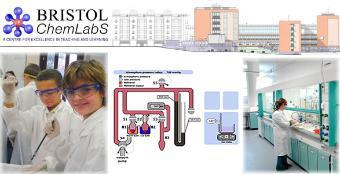Case Study: Lab preparation for students - the ChemLabs Dynamic Lab Manual
Origin
School of Chemistry
Faculty of Science
University of Bristol
Tools used
- Moodle
- Flash
- Bespoke Software
Contact
Dr Paul Wyatt, Paul.Wyatt@bristol.ac.uk
Objectives
- Shift the balance of work done for practical-based teaching to before rather than after class, so students arrive more prepared
- Create an extensive bank of online resources to support practical teaching
Background
Practical teaching is a very important part of many undergraduate degrees and a large amount of resources and staff time is put into this. However lecturers were finding students turning up to labs unprepared, with little idea of what they would be doing. This meant they did not get the full benefit of the session, and potentially created safety issues if, for example, hazardous chemicals were being used.
What was done
In 2005 the School of Chemistry became a Centre for Excellence in Teaching and Learning and was awarded a large grant from the Higher Education Funding Council of England (HEFCE). With the money, the School invested in new state of the art laboratories. However the broader aim was to transform the student experience of practical chemistry. Central to this aim is the Dynamic Laboratory Manual (DLM), an interactive online lab manual.
The main features of the DLM are:
- all information for the practical is provided online rather than as handouts or lectures. Students must work through the material and online tutorials before the practical.
- students must complete multiple choice questions before the practical. Scores form part of the overall assessment. Students get two attempts - questions are drawn from a large question bank so each test is different.
- interactive diagrams simulate the use of complicated equipment. This helps prevent costly mistakes when students use the real equipment in the lab.
- videos illustrate techniques.
- a mandatory safety quiz specific to the risks and hazards associated with that particular practical.
- post-lab reports uploaded via the manual. Students have individual logins.
- scores on all pre-lab questions are available to staff in a format which makes it very easy to see who has not completed the work to an adequate standard.
Outcomes
Student feedback about the DLM has been extremely positive. Students find it incredibly useful and feel a lot more prepared when they arrive at practical classes.
The approach has been adopted by other Schools and Faculties at the University.
Whilst these resources are highly valued by students, they require a huge amount of input (especially staff time) during the development stage. The issue of ongoing responsibility for maintaining the site also needs to be considered during the planning stage, particularly if there is no specific funding for this.
Further information
ChemLab has online demonstrations sections with examples of typical pre-lab material and questions.

